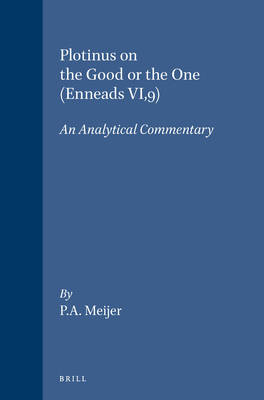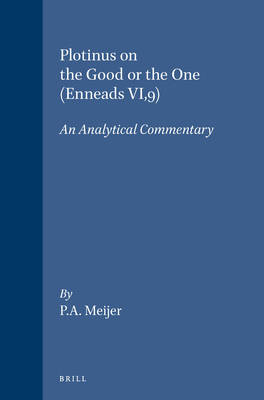
- Retrait gratuit dans votre magasin Club
- 7.000.000 titres dans notre catalogue
- Payer en toute sécurité
- Toujours un magasin près de chez vous
- Retrait gratuit dans votre magasin Club
- 7.000.0000 titres dans notre catalogue
- Payer en toute sécurité
- Toujours un magasin près de chez vous
146,95 €
+ 293 points
Description
Amazing as it may be, to this day few commentaries on the treatises of Plotinus' Enneads are written. The classic ninth treatise (VI,9 in Porphyrius' order), for example, has hardly been studied. This treatise, however, is of vital importance, because it is in this work that for the first time in the Enneads, the One in its superform emerges and Plotinus dwells on the remarkable phenomenon of a 'mystical union' of the soul with the One. A thorough analysis of the argument and its development next to philosophical and philo-logical support will be welcome to any reader of this in-triguing but difficult treatise. These aims are pursued in the main part of Meijer's work, the commentary. The first part of the book, preceding the commentary, examines the philosophical history of the concept of the One and its status in the first eight treatises. This new approach to the problem of the One leads to striking conclusions. It appears that while Plotinus was writing these first eight treatises, the concept of the One developed from that of a Supreme Entity of a Mesoplatonian character, viz. the upper part of the mind, to One of a Superone above mind. This casts an entirely new light on the position of the One in Plotinus and that of the ninth treatise itself. The third part not only examines the mystical union as pictured in the ninth treatise, but also provides a full scale discussion of Plotinus' descriptions of this union in his en-tire work. The degree of unification, viz. the question whether a part of the mystic self remains intact during the unification, is a matter of vigorous scholarly debate. Meijer shows that, in spite of some inconsistencies in his doctrine about the union, one must accept that Plotinus basically considered the union as a complete absorption of the soul into the Supreme Entity.
Spécifications
Parties prenantes
- Auteur(s) :
- Editeur:
Contenu
- Nombre de pages :
- 398
- Langue:
- Anglais
- Collection :
- Tome:
- n° 1
Caractéristiques
- EAN:
- 9789050630825
- Date de parution :
- 01-01-92
- Format:
- Livre broché
- Format numérique:
- Trade paperback (VS)
- Dimensions :
- 160 mm x 236 mm
- Poids :
- 771 g

Les avis
Nous publions uniquement les avis qui respectent les conditions requises. Consultez nos conditions pour les avis.






